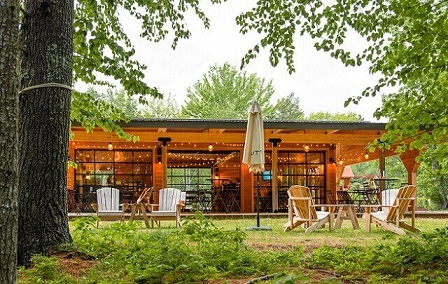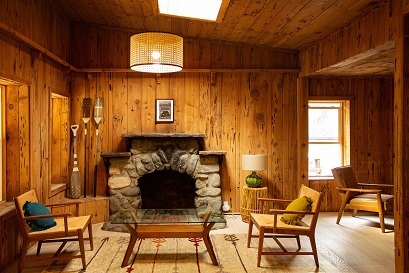 SAINT-GENIS-LES-OLLIERES, FRANCE—The philosophy behind Huttopia, a company that operates camping sites all over the world remains the same as when it was founded 23 years ago: there is no substitute to being in nature with friends and family in a comfortable way.
SAINT-GENIS-LES-OLLIERES, FRANCE—The philosophy behind Huttopia, a company that operates camping sites all over the world remains the same as when it was founded 23 years ago: there is no substitute to being in nature with friends and family in a comfortable way.
Out of their love of camping, Céline and Philippe Bossanne, a French husband and wife team, created Huttopia as an environmental project. In its early years, the company grew in Europe and recently made its debut in North America with sites in Quebec, New Hampshire, Maine, the Adirondacks and most recently Southern California. There are now 60 sites worldwide. The plan, says Céline Bossane, is to open two more sites per year in the U.S., working with small communities and protecting desirable woodland.
One element that makes Huttopia unique is its vertical approach. Not only does the family-owned firm own and operate all sites, but it also designs and manufactures all tents and cabins. “We have a design team, and we seek to create something very specific to our brand,” said Céline Bossanne. Tents and cabins provide very comfortable beds and may or may not have bathrooms in the unit depending on the site. The locations have about 100 tents or cabins with room for about 400 campers.
The company has three core sustainability pillars:
- Environmental: Each site is designed specially to avoid disrupting any of the existing nature. Tents are strategically placed around trees, so none are cut down in the development of the site. Without foundations on the tented or cabin accommodations (a patented design created by Huttopia for Huttopia), more than 80 percent of each site can be completely returned to its natural state within six months, if needed. The brand employs water reuse programs, and some sites even operate primarily off solar power.
- Social: Huttopia does not develop where they are not wanted. At each site they bring on 20 to 50 employees, which translates to an indirect 120-plus jobs in the local community as a result of the tourism demand. While the sites do have dining areas, they are intentionally not all-inclusive, to encourage visitors to get out and explore the local area. Each location has an average of 25 designated local partners (restaurants, activities, etc.), with Huttopia employees encouraging guests to visit during their trips to gain an authentic sense of the region.
- Economical: Huttopia handles every segment of the business in-house, from accommodation design to construction, business development, branding and beyond. On the consumer side, they have various accommodation styles and pricing brackets to make a stay more accessible to lower-income families (with most sites starting between $85 to $120/night per accommodation) and are strategically located to be within reach from major cities (1.5 hours from Boston, 2.5 hours from NYC, 1.5 hours from L.A., etc.) to minimize emissions from travel.
Céline Bossanne emphasizes the notion that guests should experience the region—hike, sightsee and patronize local businesses. “We are happy,” she said, “when there are not a lot of guests on the site during the day.” She said the idea for Huttopia originated when she and her husband lived in Toronto and visited Canadian and American national parks. They came up with the idea of “the art of camping.”
No Cars on the Sites
While Huttopia welcomes all kinds of guests, families are a big part of the market. There is usually a pool. The company also tries to find locations near lakes or seashores. There are no cars on the sites; they are parked on the perimeter so children can run freely. “There are no cars in nature,” said Céline Bossanne.

Huttopia sites are open seasonally depending on location. The typical season is May through October though sites might open earlier in California and there will be projects in Florida that open in winter.
In addition to its North America expansion, the company is also growing in multiple other countries, including Morocco.
Her customers, said Bossanne, like to visit multiple Huttopia sites so they can discover new regions. They might go from one site to another in the same year. Or they might go to a different one every time they take a vacation. Some customers just travel two hours from their own homes; others will go from North America to Europe or vice versa.
Huttopia gets most of its bookings directly, though it works on a limited basis with online travel agencies. “We like to have contact with customers,” said Céline Bossanne.
No matter how much the company grows, said Céline Bossanne, it will stick to its original mission. “We are more than just a tent,” she said. “We don’t want to harm nature. We want human beings to be able to appreciate nature because they are part of it.”






